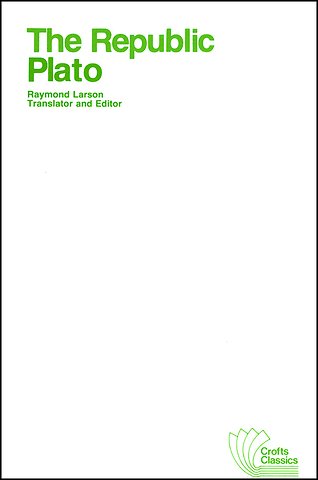


Plato werd geboren te Athene in 427 v. Chr. Hij kan beschouwd worden als verreweg de meest getalenteerde "student" van Socrates.
Meer over de auteursSamenvatting
This highly regarded volume features a modern translation of all ten books of
The Republic along with a synoptic table of contents, a prefatory essay, and an appendix on The Spindle of Necessity by the translator and editor, Raymond Larson. Also included are an introduction by Eva T. H. Brann, a list of principal dates in the life of Plato, and a bibliography.
Specificaties
Lezersrecensies
Inhoudsopgave
Introduction xxiii
Principal Dates xlvii
Current Opinions of Justice Refuted (Book 1) 1
Introductory Dialogue (Socrates and Cephalus, 328c–331d) 2
First Definition (Cephalus, 331a–d) 5
Refutation (332c–335d) 6
Third Definition (Thrasymachus, 338c–343a) 13
Refutation (339b–e) 14
Redefinition of Ruler (340d–341a) 15
Refutation (341c–343a) 16
New Argument (343a–348a) 18
Refutations of (a): i) 345b–348a) 20
Refutation of (b), 352d–354a 28
Conclusion (354a–c) 30
Justice Reexamined, in the State and in the Individual (Books 2–4) 31
Adeimantus (362d–367e) 35
The Problem Examined and Solved (368c–445e) 40
Second State of the State (372d–427c) 44
Elementary Education of the guardians (376c–415d) 48
Gymnastics (physical education), 403c–412b 73
Instilling and testing patriotism and leadership, 412c–415d 81
Living arrangements of guardians and auxiliaries (415d–427c) 85
Conclusion (427c–434d) 94
Wisdom = the knowledge of the guardians (428a–429a) 95
Courage = the auxiliaries opinion of what is and is not to be feared (429a–30c) 96
Temperance = agreement of all three classes about who should rule and be ruled (430d–432b) 97
Justice = each of the three classes tending its own business and not preempting the work of another (432b–434d) 99
Composition of the Soul (434d–441c) 101
Conclusion (441d–444e) 109
Degeneration Regimes and Souls, Interrupted (445b–449a) 113
Digression: The Best Regime and Men (Books 5–7) 114
Organization of the Best Regime (451c–461e) 116
Women and children will not be private possessions but common to all of the men. Marriage arrangements, eugenics (457c–461e) 122
The Superiority and Possibility of Such a City (462a–473e) 126
Excursus: regulations for warfare (466e–471c) 131
Such a city is not impossible (471e–473c) 136
Reminder that the best state is only a model, not completely realizable in practice (472b–473b). It is possible only if philosophers become kings or kings philosophers (473c–3), 138
The Best Men: Philosopher Kings (Guardians), Book 5, 474b–Book 7 139
The Philosophic Nature (485a–503e) 147
Higher Education of the Guardians (504a–535a) 165
The Simple of the Sun (506e–509b) 168
The Simile of the Divided Line (509d–511e) 171
The Simile of the Cave (514a–521b) 174
Curriculum (521c–535a) 181
Plane geometry, 526c–527c 186
Harmonics, 530d–531c 190
Selection of the Guardians (535a–540c) 195
Brief Excursus (540d–541b) 200
Degenerate Regimes and Souls, Resumed From Book 5 (Books 8 and 9) 201
Cause of Change or Decline in a State: Civil War (545c–547c) 203
Degenerate Regimes and Men, Described and Compared (547c–592b) 205
Oilgarchy (rule of the wealthy few) and the oligarchic man (550c–555b) 208
Democracy (rule of the people) and the democratic man (555b–562a) 213
Tyranny (dictatorship) and the tyrannical man (562a–580a) 220
The five types are judged for their goodness and happiness and ranked in the order in which they were presented: Aristocracy and the aristocratic man are the best and happiness; tyranny and the tyrant are the worst and most miserable (580a–588a) 237
Conclusion: The aristocrat is just, the tyrant unjust. Therefore justice makes a man happy, injustice makes him unhappy (588b–592b) 247
Denunciation of Imitative Poetry (Book 10, 595a–608b) 251
Imitative poetry appeals to the emotions rather than to the mind (602c–605c) 259
Imitative poetry deforms character (605c–608b) 263
Immortality and the Rewards of Justice (608b–End) 265
Rewards of Justice and Punishments of Injustice in This Life (612b–614a) 269
Rewards and Punishments After Death (614a–621d) 271
Appendix: The Spindle of Necessity 279
Bibliography 283
Vaak samen gekocht
Anderen die dit boek kochten, kochten ook
Rubrieken
- advisering
- algemeen management
- coaching en trainen
- communicatie en media
- economie
- financieel management
- inkoop en logistiek
- internet en social media
- it-management / ict
- juridisch
- leiderschap
- marketing
- mens en maatschappij
- non-profit
- ondernemen
- organisatiekunde
- personal finance
- personeelsmanagement
- persoonlijke effectiviteit
- projectmanagement
- psychologie
- reclame en verkoop
- strategisch management
- verandermanagement
- werk en loopbaan







